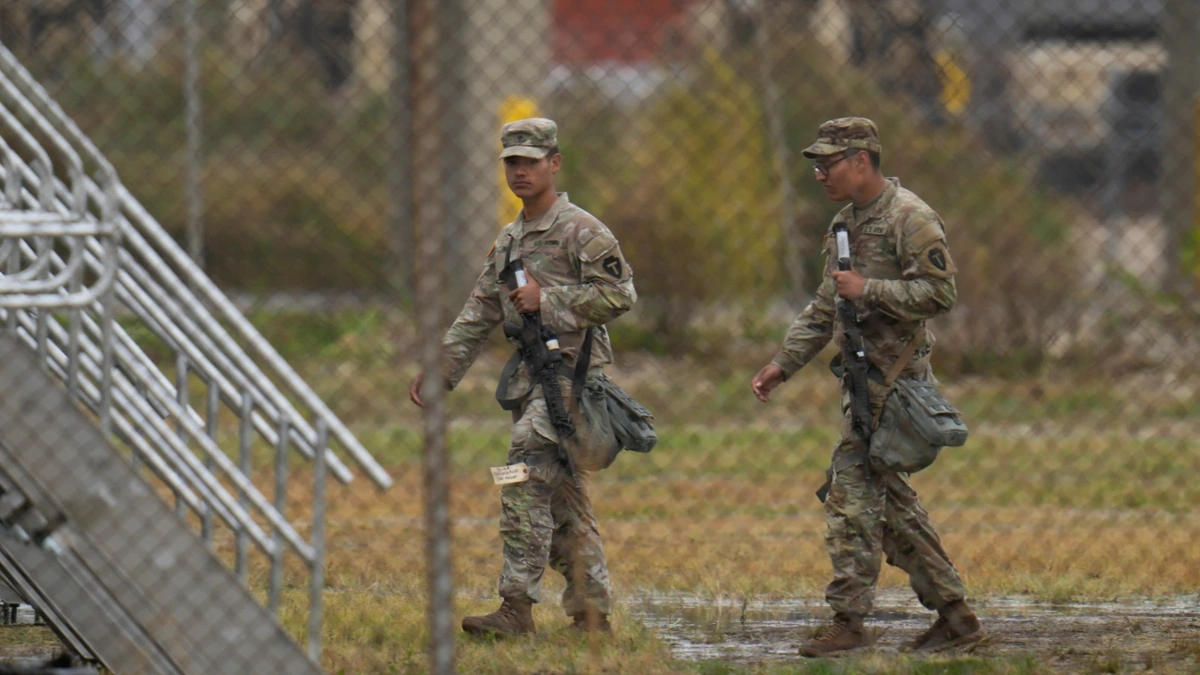So, a judge stepped in and put a stop to the deployment of the National Guard to Oregon under Trump. It sounds like a simple headline, right? But here’s the thing: it opens up a whole can of worms about federal power, state rights, and what happens when politics get intensely local. I initially thought this was just another political squabble, but the more I dug in, the more I realized this is about something far bigger than one judge or one deployment.
The “Why” | Federal Overreach vs. State Sovereignty

Let’s be honest, the battle lines are usually drawn over ideology, but the legal and constitutional angles here are fascinating. The judge’s decision hinged on arguments about federal overreach. See, the deployment of the National Guard usually requires the consent of the governor, unless there’s a very clear federal justification. The argument from Oregon was that the situation didn’t warrant such drastic federal intervention. What fascinates me is that this isn’t just about Oregon; it’s a precedent. If a president can deploy the National Guard without state consent, where does it stop? This ruling acts as a crucial check, reinforcing the principle of state sovereignty. We’ve seen this tension play out in numerous contexts, but this particular instance highlights the delicate balance that underpins the American federal system.
And, it raises questions about the Insurrection Act, a law that’s been debated heavily in recent years. Could Trump have invoked it? Maybe. But this ruling suggests the courts are ready to scrutinize such invocations closely. This is important because the Insurrection Act allows the president to deploy troops within the U.S. under certain circumstances, which, as you can imagine, raises serious concerns about civil liberties and the militarization of domestic law enforcement. Check out this related article .
The Political Battlefield | Oregon as a Case Study
But beyond the legal arguments, there’s the political context. Oregon, known for its progressive politics, became a flashpoint during the Trump era. The deployment of federal law enforcement, including the National Guard , to Portland during protests sparked massive controversy. The situation escalated quickly, with accusations of excessive force and violations of civil rights. The narrative became less about quelling unrest and more about a heavy-handed federal government clashing with a state asserting its autonomy. This deployment was, for many, a symbol of a broader power struggle. Let me rephrase that for clarity: It wasn’t just about Portland; it was about the soul of American federalism. And it’s no secret that there were issues with the crowd control measures used in Oregon.
What’s interesting is how this played out in the court of public opinion. The deployment fueled the narrative of a president willing to use federal power to suppress dissent, reinforcing existing political divisions. It became a rallying cry for those who believed in the importance of local control and the protection of civil liberties. Federal intervention , in this case, appeared to backfire, galvanizing opposition and exacerbating tensions.
National Guard: More Than Just Soldiers
Here’s the thing: the National Guard isn’t just some faceless army. These are often our neighbors, our teachers, our local business owners. They’re members of the community who also serve in the military. Deploying them has real human consequences, affecting their families, their jobs, and their communities. It’s not abstract. The impact on their lives is tangible and immediate.
Consider the emotional toll on the guardsmen and women themselves. They’re being asked to potentially confront their own neighbors, to enforce laws that might be deeply unpopular within their own communities. This creates a profound moral and psychological burden. We often forget the human cost of these political decisions, focusing instead on the larger strategic implications. And this is something that should be looked into more often. You could argue that the National Guard is a valuable tool, but it is still a very drastic step to take.
The Future of Federal-State Relations | What’s Next?
So, what does all this mean for the future? This court ruling sets a precedent, a line in the sand. It suggests that federal deployments of the National Guard will face greater scrutiny, particularly when state consent is lacking. This could lead to a more cautious approach from future administrations, a greater emphasis on collaboration with state authorities, and a renewed focus on the importance of respecting state sovereignty. And there’s a definite need for that.
The long-term impact will depend on how this precedent is interpreted and applied in future cases. It’s possible that we’ll see further legal challenges to federal authority, particularly in areas where there’s a strong divergence of political views between the federal government and individual states. This episode serves as a reminder of the enduring tension between federal power and state rights, a tension that’s likely to shape American politics for years to come. You can check out this website Wikipedia to get more information about this.
FAQ About National Guard Deployments
What exactly is the National Guard?
The National Guard is a military reserve force, composed of citizen-soldiers. They serve both state and federal missions.
Can a President deploy the National Guard anywhere?
Generally, a President needs the Governor’s consent to deploy the National Guard within a state, unless there’s a clear federal justification.
What’s the Insurrection Act?
It’s a law that allows the President to deploy troops within the U.S. under certain conditions, raising concerns about civil liberties.
Why was the deployment to Oregon controversial?
It was seen as federal overreach, suppressing dissent and violating state autonomy.
How does this ruling impact future deployments?
It sets a precedent for greater scrutiny of federal deployments without state consent.
Ultimately, this story isn’t just about a judge’s decision. It’s about the ongoing struggle to define the balance of power in America. It is about the question of state vs. federal authority. And it’s a reminder that the seemingly simple act of deploying the National Guard can have profound and far-reaching consequences.




